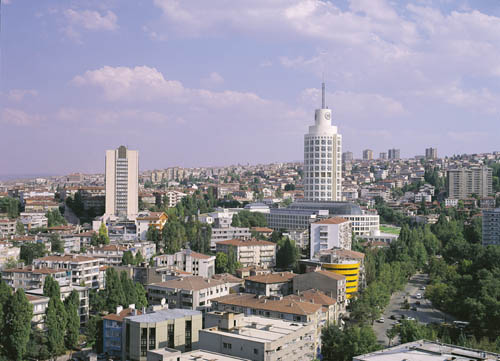Azerbaijan, Baku, Oct. 7 / Trend U. Sadikhova /
The short-term crisis in the relations between Azerbaijan and Turkey last fall put the revision of bilateral relations between the countries on the agenda for the first time, believes Cagrı Erhan, Director of the Centre for European Studies of the Ankara University.
"The only reason for this crisis was a lack of coordination of actions," Erhan said today at the Center for Strategic Studies under the Azerbaijani President, speaking about "Turkish-Azerbaijani relations: expectations and results."
Strategic relations between the two countries must evolve into a single mechanism in the Turkish-Azerbaijani alliance.
The crisis in relations between Azerbaijan and Turkey was provoked by the signing of protocols to normalize relations between Turkey and Armenia, with which Azerbaijan is engaged in a long-standing and bitter territorial conflict, on October 10, 2009. However, the documents were not ratified by the Turkish and Armenian parliaments.
Diplomatic relations between Armenia and Turkey were broken off due to Armenia's claim that the Ottoman Empire, precursor to modern Turkey, perpetrated a genocide against them in 1915 and Armenia's occupation of Azerbaijani lands as a consequence of the 1988-1994 Nagorno-Karabakh War. The Turkey-Armenia border was closed in 1993.
It will be impossible to normalize relations between Turkey and Armenia without resolving the frozen Nagorno-Karabakh conflict, Erhan said, and Armenia understands this.
However, there was not enough coordination between Turkey and Azerbaijan over the issue, he said.
The text of the protocol was handed to the Azerbaijan by Russia not Turkey, the expert said.
"Despite Turkey launching the process [of normalizing relations with Armenia] to end the occupation of Azerbaijani lands, it was impossible to achieve goals by these protocols. On the contrary, the situation worsened," he said.
He said that the protocols resulted in a crisis between Turkey and Azerbaijan and destabilization in the Turkish [arliament. As a result, the Armenian parliament refused to ratify them.
However, the protocols revealed gaps in the Turkish-Azerbaijani relations.
"Despite Turkey and Azerbaijan having signed agreements in all areas of cooperation, we must develop a mechanism for these relations in accordance, by analogy, with the mechanisms developed by Turkey with several Arab countries," he said.
As an example, he cited the abolition of the visa regime between Turkey and some Arab countries, as well as the free trade zone between Turkey, Syria, Lebanon and Jordan.
Another important factor in strengthening coordination between countries is the cooperation of Turkish and Azerbaijani diasporas abroad, he said.
The number of Americans of Azeri ethnic origin exceeds the number of Turks living in the U.S., he said. Most of them orginated from Iran.
"But it is not about quantity, but quality. Turks and Azerbaijanis living abroad must establish a lobby that can support the diaspora," he said.
Erhan also said the Turkish-Azerbaijani lobby has not had sufficient influence in the U.S. Congress in the last few years. That's why the House Foreign Relations Committee adopted a document that recognized the so-called Armenian genocide last spring, he said
Azerbaijan and Turkey deny there was any genocide against Armenians in 1915 although Armenia has been successful in getting some 20 governments in the world to accept the genocide as fact.
"It is necessary to establish ties not only between our two governments, but societies of the two countries, including the press, universities and think tanks. All this should turn into one common strategy, otherwise it will be too late," Erhan said.






